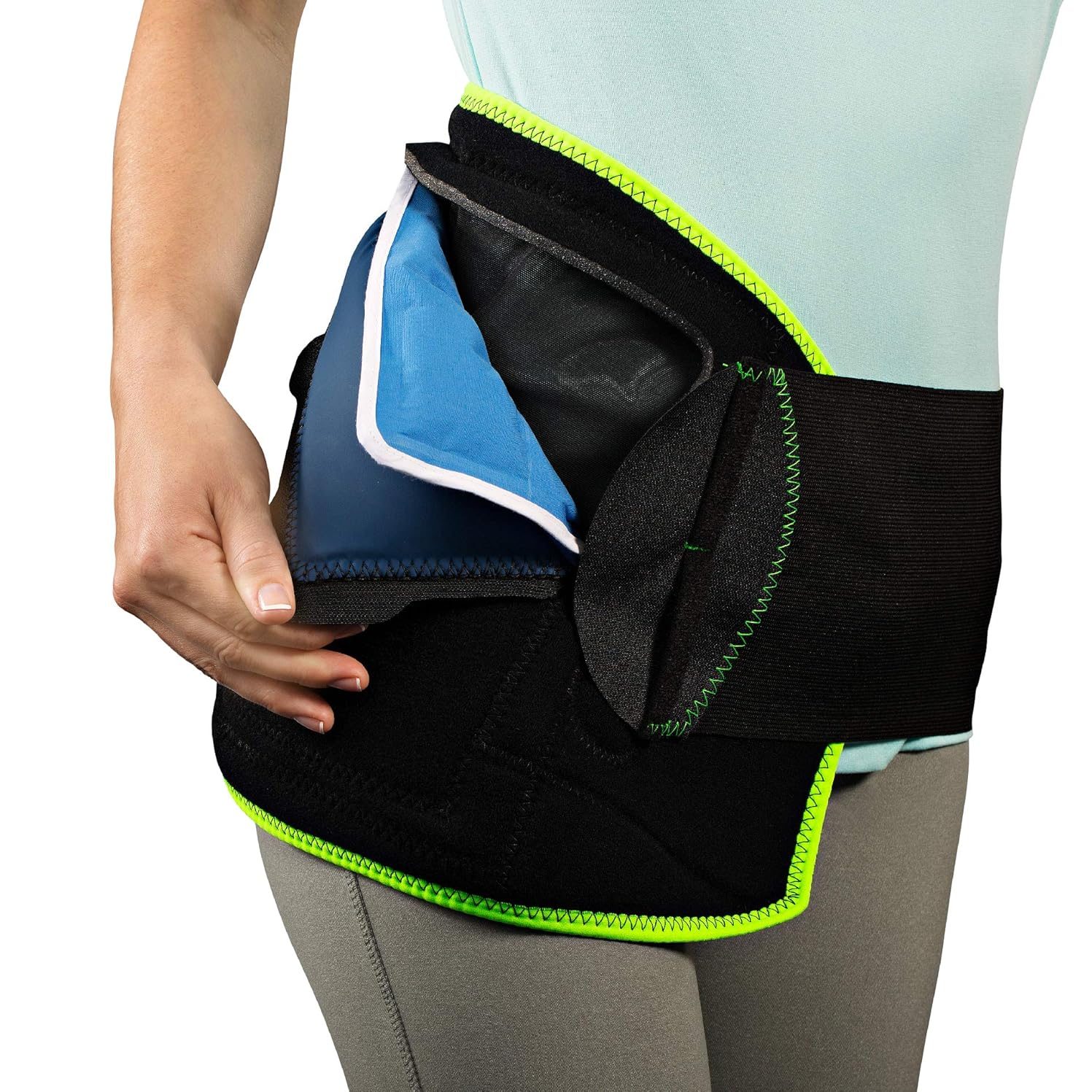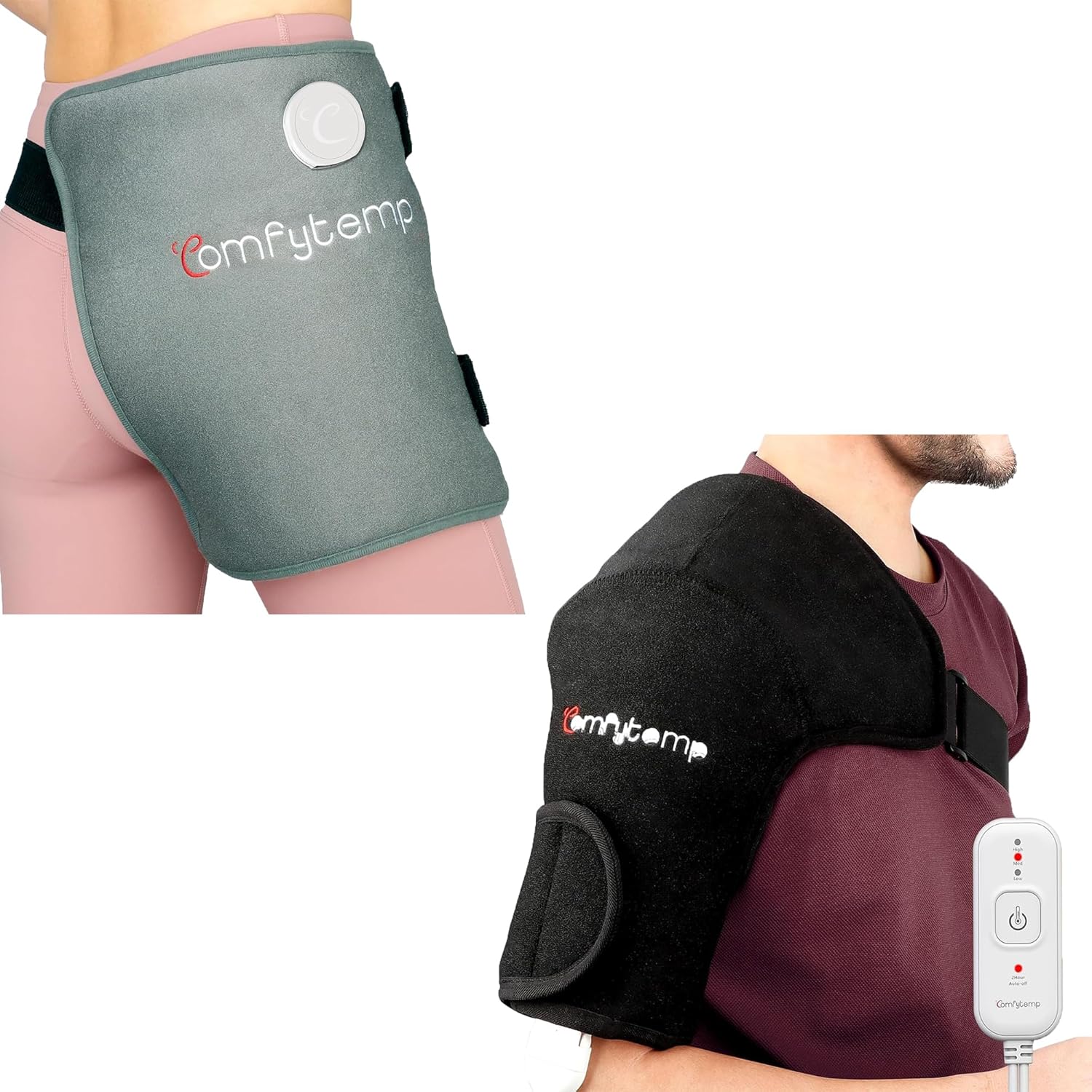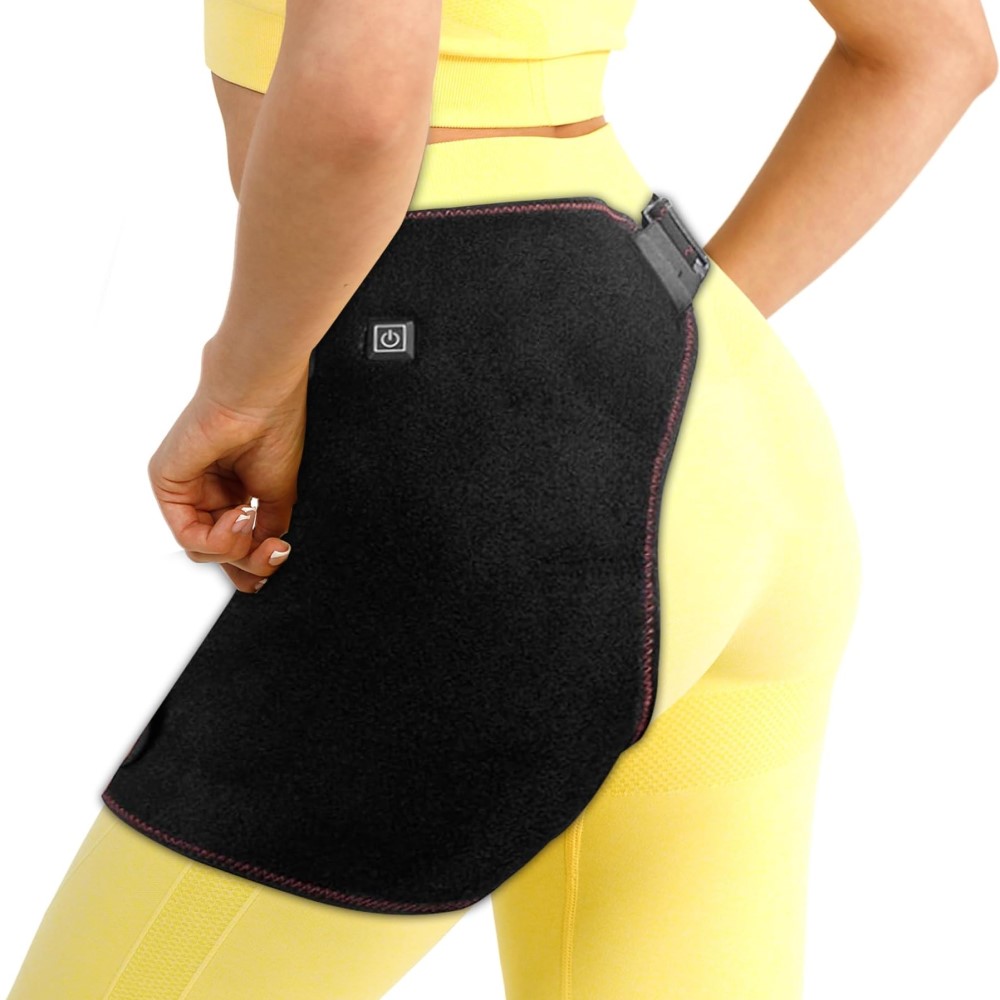The Benefits of Using a Heating Pad for Hip Pain Relief
Understanding Hip Pain and Heat Therapy
Understanding hip pain is crucial for finding relief. This type of pain can arise from various sources. They include arthritis, injuries, or even daily wear and tear. Regardless of the cause, heat therapy often helps ease the discomfort. Heat therapy works by improving circulation. It also relaxes the muscles around your hips. With better blood flow, nutrients and oxygen reach sore areas more easily. This can reduce pain and speed up healing.

Using a heating pad for hip pain is a common practice. It’s a non-invasive way to manage pain. Heating pads deliver warmth directly to the affected area. This can soothe stiff hips, reduce inflammation, and alleviate stress on the joints. It’s important to pick the right type of heating pad for your needs. Each type has its own benefits and ideal uses, as we’ll explore further.
Different Types of Heating Pads for Hip Pain
When seeking relief for hip pain, it’s important to choose the right heating pad. Various types offer targeted benefits for your needs.
Electric Heating Pads
Electric heating pads are popular for their consistent heat. They plug into an outlet, giving you control over the temperature. Electric pads often come with adjustable settings. This allows for a range of warmth levels. They are ideal for long-term use at home where an electrical source is handy.
Microwaveable Heating Pads
Microwaveable heating pads are convenient for quick, on-the-go use. They need just a couple of minutes in the microwave to heat up. These pads are typically soft and moldable, conforming to your hips easily. They’re great for short-term pain relief and can be reheated as needed.
Infrared Heating Pads
Infrared heating pads use light to create heat. This type penetrates deeper into the tissue. It aims to improve blood flow and oxygen to the affected muscles. Infrared pads can provide a different kind of heat therapy. It’s often considered more effective for deep, persistent pain.
Features to Consider When Choosing a Heating Pad
When it comes to selecting the right heating pad for hip pain, there are several features you should consider. Each of these features can have a significant impact on the effectiveness and safety of your heat therapy experience.
Size and Shape
The size and shape of the heating pad are vital. You want a pad that covers the entire area of your hip pain. If the pad is too small, it may not provide adequate heat to all the painful spots. A larger pad offers more coverage but ensure it’s not too bulky. The shape should contour to your hip area for a snug fit. This helps with consistent heat distribution.
Temperature Settings
Temperature control is a must-have feature. Different levels of heat can offer relief depending on the intensity of your pain. Look for a heating pad with adjustable temperature settings. This allows you to find the perfect heat level for your comfort and therapeutic needs. Gradual changes in temperature are safer and can prevent skin burns.
Automatic Shut-off Function
Safety is a top priority when using a heating pad for hip pain. An automatic shut-off function is an essential feature. It turns the pad off after a set time, usually an hour or two. This feature prevents overheating and cuts the risk of burns or fires. It’s especially useful if you tend to fall asleep during heat therapy sessions.
 Benefits of Using a Heating Pad for Hip Pain
Benefits of Using a Heating Pad for Hip Pain
The benefits of using a heating pad for hip pain are numerous and can significantly enhance your comfort and recovery process.
Immediate Pain Relief
Heating pads offer immediate pain relief by soothing the affected area. The warmth relaxes tight muscles and joints, helping to lessen discomfort.
Improved Circulation
Applying heat boosts blood flow to the hip. This increased circulation brings more oxygen and nutrients to the tissues, aiding in healing.
Reduced Stiffness
Regular use of a heating pad can make the hip more flexible. Warmth decreases stiffness and allows for easier movement.
Convenient and Non-Invasive
A heating pad for hip pain is a convenient form of therapy. You can use it at home and it does not require surgery or medication.
Cost-Effective
Compared to other pain relief methods, heating pads are affordable. They offer a low-cost solution for managing hip pain.
Use Anytime, Anywhere
Portable heating pads allow you to relieve hip pain no matter where you are. You can maintain your daily routine without interruption.
Complements Other Treatments
Heating pads can be used alongside other treatments. They support physical therapy, exercise, and medication, for a holistic approach.
By addressing hip pain with the right heating pad, you leverage a safe and straightforward method to alleviate pain and stimulate recovery. Always consult with a healthcare provider to ensure heat therapy is suitable for your specific condition.
How to Use a Heating Pad Safely for Hip Pain Relief
Using a heating pad for hip pain can provide much-needed relief, but it’s important to do so safely to avoid any harm. Here are some steps and precautions:
Start with a Lower Temperature
Begin with a lower setting and increase heat gradually. This helps your body adjust and prevents skin burns.
Set a Time Limit
Don’t use the heating pad for too long in one session. Stick to the recommended time, usually 15-20 minutes, to avoid overheating.
Check the Skin Frequently
Keep an eye on the skin where the pad touches. It will help you spot any signs of burns or irritation early on.
Use a Barrier
Place a cloth or towel between your skin and the heating pad. This extra layer protects your skin from direct heat.
Follow Instructions
Read and follow the heating pad’s manual. Each product may have specific usage guidelines.
Stay Awake
Avoid falling asleep with the heating pad on to prevent prolonged exposure, which can lead to burns.
Consult Healthcare Providers
If your pain persists or worsens, get advice from a professional. They can also ensure heat therapy is right for you.
By keeping these tips in mind, you will make the most of the relief offered by a heating pad for hip pain, while maintaining safety and preventing any potential harm.
Recommended Heating Pad Brands and Products
With knowledge of features and benefits, choosing the right brand and product is the final step. Here are some top recommendations for heating pads designed for hip pain relief.
High-end Options
For those seeking premium choices, certain brands stand out. They often include advanced features like precise temperature controls, and memory functions. These pads may offer longer warranties, ensuring reliability and user satisfaction.
Budget-friendly Choices
You don’t have to break the bank for quality. There are cost-effective heating pads that still provide comfort and relief. Look for ones with basic temperature settings and sufficient coverage.
Specialized Heat Therapy
Some brands specialize in certain types of heat therapy, such as infrared. These can be a bit pricier, but they’re worth considering for deeper tissue relief.
Portable Solutions
For relief on the go, compact and cordless options are available. These are perfect for travel or office use, allowing you to manage your hip pain wherever you are.
Remember to consider the type of heating pad that aligns with the features you need and the type of relief you’re seeking. Always read customer reviews and product descriptions carefully to make an informed choice. Stick with known brands that have good warranties and customer service for a safer purchase. By selecting a reputable brand and product, you’ll be able to soothe your hip pain effectively and safely.
 Complementary Treatments Alongside Heating Pads
Complementary Treatments Alongside Heating Pads
While heating pads for hip pain offer great relief, combining them with other treatments can enhance your recovery. It’s good to consider complementary therapies to address hip pain systematically. Here are some additional methods that work well with heating pads:
Physical Therapy
Physical therapy exercises can strengthen the muscles around your hips. This supports joint stability and can reduce pain. A physical therapist may suggest exercises specific to your condition.
Massage Therapy
Massage can further relax tight muscles and improve blood flow, just like heat therapy. Combining both may yield better results for pain relief and muscle function.
Over-the-Counter Pain Medication
Medications such as ibuprofen or acetaminophen can reduce inflammation and pain. They work well when you use heating pads between doses, as recommended by your doctor.
Stretching Exercises
Regular stretching can maintain hip flexibility and reduce stiffness. Doing stretches after using a heating pad may be more effective since muscles are already warm and pliable.
Acupuncture
Acupuncture can stimulate healing and pain relief in your hips. It involves the placement of tiny needles into specific points on the body. Many find it beneficial alongside heat therapy.
Anti-inflammatory Diet
Your diet plays a role in inflammation and pain. Eating anti-inflammatory foods may support your overall treatment plan. This includes fruits, vegetables, and omega-3 rich foods.
Embrace these complementary treatments to maximize the benefits of using a heating pad for hip pain. Always consult with your healthcare provider before starting any new treatment approach.